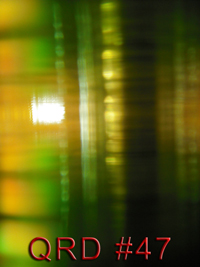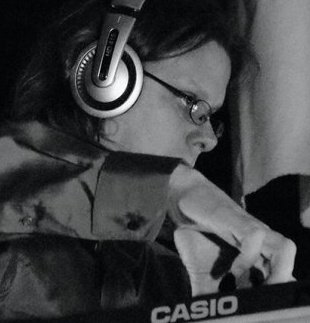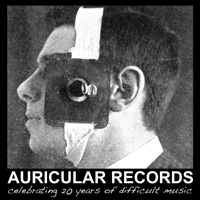














January 2011

Label: Auricular Records
City: San Francisco, CA & Redwood City, CA
Artists Roster: Nux Vomica, Voice of Eye, big city orchestra, Giligadi, Noisepsalm, Andrez Bergen, Drew Dobbs, Instagon, G:NOME, Barry Dillon, Rhedceruelan, My Boyfriend the Pilot & almost 100 more since 1989
Websites: www.auricular.com
QRD – When & why did you start your label?
Alan – Our label grew out of a retail record store in San Francisco, CA. The label started in approximately 1990. We started the label to hope to share & spread the music of some of the musicians & experimental artists whom we already had a relationship with as well as to try to advance some personal musical projects.
QRD – Where did you get the money to finance your first few releases?
Alan – The first few releases were cassette only DIY release with handmade packaging. The cost came entirely out of pocket.
QRD – How many releases have you put out?
Alan – I believe we have released close to 100 titles at this point.
QRD – How many releases would you like to do a year?
Alan – We try to stay a little more focused these days & are trying to work on more specialized projects like the My Boyfriend the Pilot 10-year retrospective box set. I would like to average about 8-10 releases per year if finances & sales support it.
QRD – How many hours a week do you work on the label & how many would you like to?
Alan – It is very hard to calculate this - some nights I will work countless hours on graphics or web updates, or mastering or running off CDrs. I have never really kept track as it has always been a labor of love. I find it even hard to venture a guess at how many hours a week I put in. Let’s just say it is more than 1 & less than 30.
QRD – What are the fun &/or rewarding parts about running a label?
Alan – Being able to expose people to music they have never heard before & helping an artist to get that little bit of an extra reach that they might not have had - whether it is finding a way to sell their product or be heard, or just having a handful of CDs they can give away or sell to their fans at a local show.
QRD – How have your motivations for having a label changed?
Alan – I am definitely not in it for money - in the past I thought I could at least call it a viable side job, but now it is all for the love of the art.
QRD – What do you feel is the biggest waste of your time running the label?
Alan – I don’t look at any of it as a waste
of time. Even the tedious chores - stuffing envelopes, printing out press
releases, etc. - become somewhat meditative.
QRD – What are some labels you admire
or feel a kinship to?
Alan – From the standpoint of the artists produced & released by the labels & the music itself, I have always loved Touch. Mute is also a label I admire for the absolute awe-inspiring breadth & scope of what they have done.
QRD – What other work experiences prepared you to have a label?
Alan – I’d have to say scraping by as an administrative temporary office worker taught me a lot of the patience & the mastery of the copy machine necessary for keeping a small label up & running.
QRD – What makes your label special & unique?
Alan – Hmmmm, I am not sure there is much unique about our label that wouldn’t be unique about many other labels. As time has unfolded I do see over & over artists who appear on our label forming friendships & forging new projects together. Our label does function as a somewhat dysfunctional family of sorts at time.
QRD – How has your physical location effected your label?
Alan – Originally our label was associated with a record store in San Francisco’s Lower Haight neighborhood. This was a hotbed for not only the artists, but the audience that was attracted to our special brand of experimental music, ambient audio, & soundart projects. I met most of our artists in that store as customers & as time has moved on & our label has changed locations it is really an extension of that original family of artists as well as those we find or who find us through the internet that drive what our label does & how we operate.
QRD – Do you enjoy music as much now as you used to & how has running a label effected how you listen to/hear music?
Alan – I most definitely enjoy music just as much now as when I started this endeavor. I also dislike bad music even more than I used to. Running a label has made me more critical & also helped me to listen with a more trained ear to what lies below the surface in many instances.
QRD – What’s your demos policy?
Alan – We accepts demos anytime, but really suggest that an artist planning to submit a demo to us should take the time to listen to our available releases. Even though the releases vary greatly in range & genre & style it is pretty easy to determine if Auricular would be a good home for your recording. We also are very explicit of the fact that we aren’t signing anyone to a contract or paying any advances. We have never had a breakthrough that sold enough copies to even send us on a vacation to the next state. A very good thing to understand is that being on Auricular Records makes you part of an extended family of like-minded artists. All proceeds from the sales of any release are entirely used to pay for the costs of the next release(s).
QRD – How do you find out about new artists for your label?
Alan – We make regular announcements on social networks. Our website is our first & foremost marketing & sales tool. Occasionally we may participate in an event, live show, showcase, festival, radio program, or some other media event; but the internet is our marketing tool of choice. Email - Social Networks - Website are the king for us.
QRD – How do most fans find out about your label?
Alan – It is really hard for me to answer this question. I am not sure at all. I met one woman who told me recently, “My brother bought all your cassette releases in the early 90s.” I think some people just discover us by accident & there is certain to be a word of mouth factor involved somehow.
QRD – What’s been your biggest selling release & why do you think it was?
Alan – Our biggest seller was Nux Vomica’s release Casting a Dream to the Sea. The sales of that title may have been due to the sheer number of live shows Nux Vomica had been doing at the time it was released. Nux Vomica were performing more frequently than they ever had at that point & were involved in a lot of shows & radio programming. This was also one of the first really dark ambient, less noise-based, Nux Vomica titles & marked a huge shift in both the temperament & lineup of the band.
QRD – What release that you’ve done was the most important & special to you personally?
Alan – Our first release will always be special. The audio quality was terrible but the packaging was amazing. Auricular Audio Magazine #1 was a compilation featuring The Haters, Nux Vomica (with Chemical Toybox), Big City Orchestra, & the Molecules. It was a cassette only release that came with a small booklet that was all attached between two 7” vinyl records that had been sewn together with twine. The lineup on that compilation continued to work & perform together for many shows in the San Francisco Bay Area. I always look at that release as the start of the label & the start of a lot of close friendships & artistic endeavors.
QRD – How involved do you like to be in the artwork design for a release?
Alan – I really enjoy being involved in the graphic design aspect of the release. I have found this helps to keep the look & feel of our releases in alignment with other releases on the label.
QRD – How long is it from when an artist delivers an album to you until release date & why?
Alan – This varies widely - I have gotten a release out in a week & others I have worked on for over 6 months or more. The primary factors involved in timing a release are the prior commitments we have with the label, my work schedule, & most importantly the complexity of the release (special packaging etc) & finally finances.
QRD – If you really like a band, but aren’t sure you could sell many copies of their record; what do you do?
Alan – I would be pretty honest with the band & I have been. This is the case of artists on our label 99.9% of the time primarily because we work in such a niche market. If the band still wants to release with us & even help out in the marketing & sales of the release I am more than happy to move forward. Often we have served as an easy way for an artist to get copies of their music to sell at shows or use as promotional material. If they are happy working with us - I am happy working with them.
QRD – How is financing of a release split between artists & the label?
Alan – The costs of a release come entirely out of my pocket & some costs are offset by us allowing the band to purchase copies at close to cost to sell anywhere, for any price they want.
QRD – Do you take a cut of a band’s publishing?
Alan – Any artist recording on our label retains 100% of their publishing rights. If they get signed by another label that can offer them a new Porsche & a mansion, then I want them to have that.
QRD – How big of a staff do you have & how big of one do you need?
Alan – Our label is a staff of one - being a small experimental music label does not usually allow you to make any money so with that comes no staff. I would never turn away anyone who wanted to work for me. They would have to create their own job & be very happy with no pay - just like me.
QRD – Do you think the album format is dead?
Alan – I certainly don’t think the album format is dead.
QRD – Do you think the return of vinyl & cassettes is a fad?
Alan – Cassettes is a hard call for me - they afforded a lot of DIY artists & small labels, including ours, to get their start; but honestly the sound quality & durability is just terrible. From a nostalgia perspective I find the rebirth in popularity somewhat comforting, but it is very hard for me to say if it will be lasting. I may be prejudiced with my answer regarding vinyl. I am a self-proclaimed & possibly diagnosed vinyl junkie. I prefer vinyl to all other formats so far. I would prefer to see vinyl come back in force & see more artists embracing vinyl again.
QRD – What do you think of ultra-limited runs of releases (less than 100 discs)?
Alan – Our label is built around ultra limited runs & I really like the idea. I think the ultra limited runs also makes the dedicated consumers appreciate what they have more & see it as truly more unique than a mass-produced release.
QRD – What do you think of “print on demand” discs?
Alan – On demand disc printing is brilliant from many perspectives. A large portion of what we do is on demand CDr releases now. I feel it relieves a lot of the stress associated with selling through boxes & boxes of a title to regain an investment. The “green” factor is another huge plus to on-demand publication. I worked for a larger scale indie label & used to watch them throw away boxes & boxes of vinyl recordings that didn’t sell. I have seen tons of CDs destined for cut out bins & then landfill. More on demand CD releases means less money & resources wasted & more resources & money available for additional titles & artists.
QRD – What changes in things would cause you to stop your label?
Alan – Loss of hearing or complete immobility - massive head wound or brain trauma.…
QRD – What would you suggest to someone starting a label today?
Alan – Look deep inside yourself & make sure that you are doing this for love of the music & the artists & as a patron of the arts & not as a moneymaking venture. Be true to your artists & treat them with the respect they deserve & recognize them as a family that you have built from scratch.
QRD – Why do you think labels are still important to artists?
Alan – In out label’s case I think it serves as an umbrella for everyone to gather under to feel you are not alone trying to get your music heard. It helps to let the artists see there is at least someone else willing to put down a little money, time, or belief with them in the dream they have or be willing to work with them even just a little towards a goal. I also think it helps an artist to feel they belong to family or collective that understands them or is faced with the same challenges they are.
QRD – In 20 years what do you think/hope your label will be known/remembered for?
Alan – I hope will be remembered for not
compromising our integrity & always being a support mechanism, no matter
how small or how big, for the artists we work with. I can’t make someone
rich by any means - I am just not capable of that at all - but I can share
& help in whatever way I can & I enjoy it.







